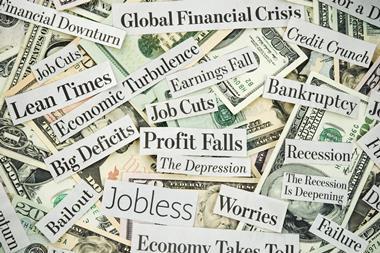The war in Ukraine is one of the major crises of our times. It is exposing the limitations of insurance
A series of highly disruptive events, including a financial crisis, Brexit, a global pandemic and the climate change crisis have taken its toll on global economic stability.
Just as many businesses were on track to recovery post-pandemic, the Russian invasion of Ukraine has led to significant increases in operating costs and severe disruptions to supply chains, challenging the resilience of many businesses.
The war in Ukraine and its global repercussions is undoubtedly one of the major crises of our times.
Mactavish’s business resilience survey found that 90% of companies expect the Russian invasion of Ukraine to impact the resilience of their business, while 77% of businesses have already been forced to make changes around their supply chain as a consequence of the war.
Now, more than ever, businesses across the world are looking to the insurance market to limit and recover their losses.
But, for an industry already rocked by a series of unprecedented crisis events, resulting in one of the toughest markets in insurance history, delivering against the promise to safeguard these organisations is challenging.
Our survey of UK businesses found nearly 60% had reported an insurance loss due to the crisis, but the challenges of the current climate are testing the resilience of all business.
Nearly every business has felt the impact of rising energy prices. The price of oil, natural gas and coal have all risen sharply since the start of the conflict, which has had a global economic impact and led to harmful inflationary trends.
Capacity crunch
The primary role of insurance is to provide protection against financial loss from unforeseeable or unlikely events. However, past crisis events have exposed the limitations of this model and current insurance practices are now under the microscope.
While global insurers have announced $1.3 billion in direct losses from the Ukraine crisis in the first quarter of 2022, some estimate that eventual losses could exceed $20 billion, therefore many insurers and reinsurers are putting aside large sums for this eventuality.
As a result, commercial insurance pricing has continued its dizzying trend during 2022, with UK commercial premiums now having seen more than four years of uninterrupted price increases.
The problem is that this comes at a time when companies are more exposed to risk and require more accessible support.
Instead, the industry’s response has been characterised by a withdrawal of capacity.
There are more cover restrictions, more disputes and higher prices that are creating enduring hardship for policyholders, rather than building an understanding of clients’ risk and working together with them to manage and reduce it.
Companies less able to pass on price increases to consumers are already struggling in this environment and will not find it easy to absorb such a shortfall in insurance recovery if they suffer a major loss.
In light of recent events, organisations must focus more strategically on issues of crisis management. Insurance can no longer be viewed as a commodity purchase, but as a key financial component of a company’s capital structure. One that has tremendous value, but one that requires attention to structure properly and reliably.
With traditional insurance no longer being systematically suitable, due in part to an over-reliance on standardised policies, there’s growing pressure on policyholders to step-up and build in-house expertise to ensure the viability of their insurance programmes.
These systemic issues have added to a lack of market expertise to understand emerging risks and leading to an erosion in the quality of cover and a lack of accountability.
At the root of this is an insurance system that has prioritised low transaction costs above risk understanding and reliable insurance policies. This approach is not fit for purpose and at odds with the environment we now find ourselves in.
Time to rebuild trust
For example, war and sanction exclusions, which exist in most commercial insurance policies, can have far-reaching impacts, restricting cover beyond simply trading with sanctioned entities or governments.
We recently encountered a policy with a worldwide charity that included an exclusion for any loss indirectly involving a Russian citizen (including dual citizens) anywhere in the world, regardless of whether the claim had anything to do with Russia.
There is clearly a pressing need for more diligence around risk placement processes to tackle evolving risks in a high-risk operating environment.
In May this year, the UK FCA sent a letter to all market intermediaries criticising a “poor culture and poor value” for buyers, sharing its concerns at the lack of any real change.
Then in September, the financial watchdog warned insurers to protect customers’ wellbeing during cost of living squeeze from unnecessary products, add-ons or unfair penalties as fears emerged customers may cut back on the insurance they need as a result.
Obstacles to resilience
Instead, as this crisis deepens, cover is being withdrawn and businesses are being priced out of critical covers, a problem exacerbated by broker conflicts of interest. All these issues constitute major obstacles to business resilience.
The insurance industry is that bedrock, yet this testing time may instead result in an unprecedented loss in confidence in the insurance market as a whole as demonstrated in our survey, with over half of the businesses expecting their insurance programmes to be negatively impacted by the crisis.
The insurance market must now, more than ever, accelerate its transformation to propose adaptable solutions to increasingly volatile risks.
It must demonstrate genuine understanding and create a partnership approach that helps protect against the unpredictable and reduces client risk over time, encouraging good risk management practices rather than a blanket withdrawal of coverage and indiscriminate price increases.
The more partnership-oriented brokers and insurers there are, the greater the opportunity for differentiation and the greater the challenge to the status quo.
Trust and reputation are paramount, and this period of uncertainty must be used to rebuild and refocus. If not, the irreparable reputational damage will continue to be felt for many decades to come.
Bruce Hepburn is chief executive and founder of Mactavish




















No comments yet